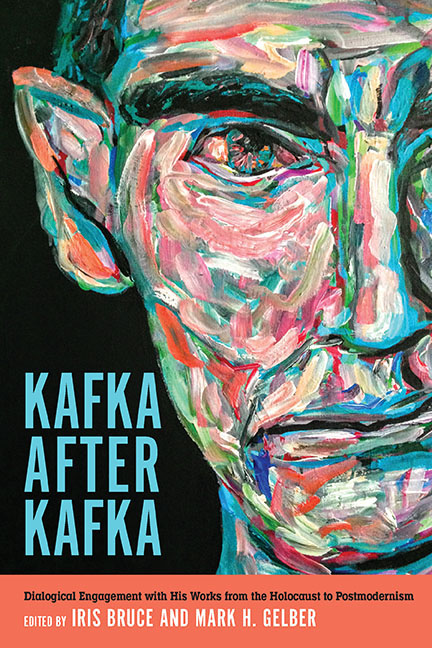Book contents
- Frontmatter
- Contents
- Acknowledgments
- Introduction
- Part I Philosophical and Literary Hermeneutics after the Holocaust
- Part II Kafka in Israeli Cultural Space
- 5 Kafka and Brod after the Trial and Judgments in Israel
- 6 “A Nightingale Whose Tongue Was Chopped Off”: The Melancholic Writing Machine in Ya'acov Shṭeinberg's and Ḥezi Leskly's Poetry, after Kafka
- 7 Exiles in Their Own Lands: Kafka and Sayed Kashua
- Part III Kafka from Modernism to Postmodernism
- Notes on the Contributors
- Index
7 - Exiles in Their Own Lands: Kafka and Sayed Kashua
from Part II - Kafka in Israeli Cultural Space
Published online by Cambridge University Press: 12 April 2019
- Frontmatter
- Contents
- Acknowledgments
- Introduction
- Part I Philosophical and Literary Hermeneutics after the Holocaust
- Part II Kafka in Israeli Cultural Space
- 5 Kafka and Brod after the Trial and Judgments in Israel
- 6 “A Nightingale Whose Tongue Was Chopped Off”: The Melancholic Writing Machine in Ya'acov Shṭeinberg's and Ḥezi Leskly's Poetry, after Kafka
- 7 Exiles in Their Own Lands: Kafka and Sayed Kashua
- Part III Kafka from Modernism to Postmodernism
- Notes on the Contributors
- Index
Summary
Am I a circus rider on 2 horses? Alas, I am no rider, but lie prostrate on the ground.
—Franz Kafka, Letters to Felice (1916)The impasse or aporia of consciousness that seems to be the representative postmodern experience is a peculiar strategy of doubling.
—Homi Bhabha, The Location of Culture (1994)SAYED KASHUA (1975–), Israeli Arab journalist, satirist, novelist, and producer of the popular sitcom Arab Labor (Avodah Aravit [slang for “Cheap Arab Labor”], 2007–14), left Israel with his family in 2014 and presently resides in the United States. After the hopelessness and cynicism that characterized his novels Dancing Arabs (2002) and Let It Be Morning (2006), his most recent novel, Second Person Singular (2010), seemed to convey a more optimistic message and has been turned into a sentimental, Hollywood-type movie, Dancing Arabs (2014; also released as A Borrowed Identity). In both film and novel a young Israeli Arab undergoes an incredible metamorphosis into a Jew. The novel received Israel's prestigious Bernstein Prize for its “fascinating and satirical look at Israeliness and especially the Arab-Israeli mind, a topic that has barely been reflected in Hebrew literature,” and for offering “a complex and challenging look at Israeli society as a multicultural society.” Like Kashua's previous works, however, this novel's “complex and challenging look” also points to a lack of tolerance and respect for cultural diversity in a multicultural Israel.
All of Kashua's Israeli Arab protagonists struggle for acceptance but fail to receive it from Israeli society. Kafkaesque metamorphoses are everywhere in his work. Both Franz Kafka and Sayed Kashua use the metamorphosis metaphor to depict identity problems that are caused by the protagonists’ unsuccessful attempts to be accepted by the dominant culture. Only one protagonist in Kafka's writings seems to have achieved this virtually impossible goal: the ape Rotpeter, who, like Kashua in real life, is honored and recognized by an educational institution for his achievement. And only one of Kashua's characters seems to have a future: Amir in Second Person Singular, who undergoes the miraculous metamorphosis into a Jew. Yet Kafka's satire exposes Rotpeter's life as a tragedy, and it is questionable whether Amir's rebirth can possibly signal a new beginning.
- Type
- Chapter
- Information
- Kafka after KafkaDialogic Engagement with his Works from the Holocaust to Postmodernism, pp. 118 - 140Publisher: Boydell & BrewerPrint publication year: 2019

